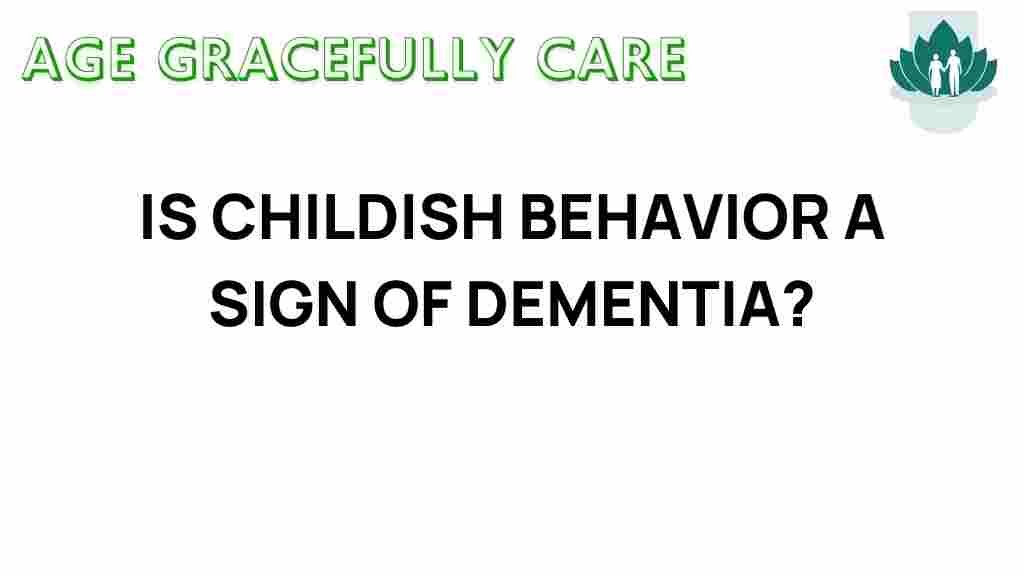Is Childish Behavior a Hidden Warning Sign of Dementia?
As we age, it’s natural for our bodies and minds to undergo various changes. However, when certain behaviors surface, particularly those that might be classified as childish, it can raise concerns about underlying mental health issues, including dementia. Understanding the connection between childish behavior and dementia is crucial for early detection and intervention. In this article, we will explore how these behaviors can be warning signs of cognitive decline, the importance of awareness around dementia, and what steps can be taken if you notice these symptoms in yourself or a loved one.
Understanding Dementia and Its Symptoms
Dementia is an umbrella term for a range of neurodegenerative conditions that affect cognitive function, memory, and the ability to perform everyday activities. The symptoms of dementia can vary widely but often include:
- Memory loss
- Difficulty with communication
- Personality changes
- Impaired judgment
- Childish or inappropriate behavior
Childish behavior can manifest as regressive actions, such as throwing tantrums, excessive pouting, or displaying a lack of impulse control. These actions may be alarming to family members and friends and could serve as a warning sign of cognitive decline.
The Connection Between Childish Behavior and Cognitive Decline
Childish behavior in older adults can often be mistaken for typical aging or stress responses. However, it is essential to recognize that these behaviors can indicate deeper issues related to mental health and cognitive decline. Some key points to consider include:
- Neurodegenerative Processes: Conditions like Alzheimer’s disease and frontotemporal dementia can lead to changes in personality and behavior. Affected individuals may become more impulsive or exhibit behaviors typical of much younger individuals.
- Emotional Responses: Adults experiencing cognitive decline might resort to childish behavior as a coping mechanism for stress or confusion, signaling their struggle to process emotions effectively.
- Social Withdrawal: As dementia progresses, individuals may withdraw from social situations, leading to frustration that can manifest as childish or aggressive behavior.
Recognizing Other Warning Signs of Dementia
In addition to childish behavior, there are several other warning signs of dementia that individuals and caregivers should be aware of:
- Memory Loss: Frequently forgetting recent events or repeating questions.
- Difficulty in Planning: Trouble following a plan or handling tasks that require multiple steps.
- Confusion with Time or Place: Losing track of dates, seasons, and the passage of time.
- Changes in Mood: Experiencing sudden mood swings or changes in personality.
Awareness of these symptoms is essential for early intervention, which can significantly improve the quality of life for those affected.
Step-by-Step Process for Addressing Childish Behavior
If you or someone you know is exhibiting childish behavior that could be a warning sign of dementia, consider following these steps:
- Observe the Behavior: Take note of specific instances of childish behavior. Record when they occur, what may trigger them, and how frequently they happen.
- Assess Other Symptoms: Look for additional warning signs of dementia listed above, such as memory loss or confusion.
- Consult with a Healthcare Professional: Schedule an appointment with a doctor or neurologist who specializes in cognitive disorders. Bring your observations and any notes you have taken.
- Consider Cognitive Testing: A healthcare professional may recommend cognitive testing to assess the extent of cognitive decline and rule out other conditions.
- Explore Treatment Options: Depending on the diagnosis, discuss treatment options, which may include medication, therapy, or lifestyle changes.
Troubleshooting Tips for Caregivers
As a caregiver, encountering childish behavior in a loved one can be challenging. Here are some troubleshooting tips to help manage these situations:
- Stay Calm: It’s essential to remain calm and composed. Responding with frustration can escalate the situation.
- Redirect Behavior: Gently redirect the individual’s attention to a different activity or topic to alleviate distress.
- Provide Reassurance: Offer comfort and validation. Let them know it’s okay to feel confused or upset.
- Establish Routine: Creating a structured daily routine can provide a sense of stability and predictability, reducing anxiety and regressive behaviors.
- Encourage Social Engagement: Encourage participation in social activities that match their cognitive abilities to help maintain social skills.
If you’re looking for more resources on managing dementia symptoms and improving mental health, consider checking out this guide on dementia care.
Conclusion
Childish behavior can indeed be a hidden warning sign of dementia, signaling cognitive decline and underlying mental health issues. By recognizing these behaviors alongside other symptoms, individuals and caregivers can take proactive steps towards seeking help and intervention. Awareness is crucial in the fight against dementia, as early diagnosis and treatment can lead to better outcomes for those affected. If you notice these behaviors in yourself or a loved one, don’t hesitate to reach out to a healthcare professional for guidance. Remember, understanding and compassion are key in navigating the complexities of aging and mental health.
By maintaining an open dialogue about symptoms and behaviors, we can foster a supportive environment for those experiencing dementia and contribute to a broader awareness of this condition.
For further reading on aging and cognitive health, visit this external resource for more insights and information.
This article is in the category Health and created by AgeGracefullyCare Team
